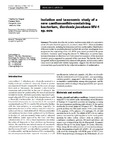Isolation and Taxonomic Study of a New Canthaxanthin-Containing Bacterium, Gordonia jacobaea MV-1 sp. nov

Use este enlace para citar
http://hdl.handle.net/2183/41875Coleccións
- Investigación (FCIE) [1260]
Metadatos
Mostrar o rexistro completo do ítemTítulo
Isolation and Taxonomic Study of a New Canthaxanthin-Containing Bacterium, Gordonia jacobaea MV-1 sp. novData
2000Cita bibliográfica
Miguel, T. de, Sieiro, C., Poza, M., & Villa, T. G. (2000). Isolation and taxonomic study of a new canthaxanthin-containing bacterium, Gordonia jacobaea MV-1 sp. nov. International microbiology : the official journal of the Spanish Society for Microbiology, 3(2), 107–111. PMID: 11001540. https://revistes.iec.cat/index.php/IM/article/view/4c457c111e89d.002
Resumo
[Abstract] This article describes the isolation and taxonomic study of a coryneform isolate of a new Gordonia species (G. jacobaea), strain MV-1, which accumulates several carotenoids, including the ketocarotenoid trans-canthaxanthin. Identification of this new isolate by morphobiochemical methods did not allow unambiguous taxon assignment, but sequencing of the 16S rRNA gene clearly pointed to the genus Gordonia, Gordonia sputi being the closest fit. Differences in certain transversions/ transitions in otherwise very well-conserved sequences of the described Gordonia species supported the proposal of this new taxon. The fact that both the best growth and best pigmentation were obtained with glucose, an inexpensive carbon source and at an industrially suitable temperature, suggests that this new bacterial strain may have good potential for the industrial production of canthaxanthin.
Versión do editor
Dereitos
The journal International Microbiology allows users to freely download, copy, print, distribute, search, and link to the full text of any article, provided the authorship and source of the published article is cited. The copyright owner's consent does not include copying for new works, or resale. In these cases, the specific written permission of International Microbiology must first be obtained.
ISSN
1139-6709





